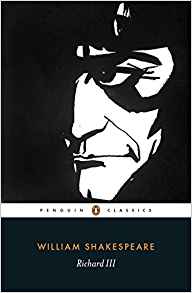Internet trolls and literary villains have more in common than you think, says Griselda Heppel
Let
me ask you something: who do you think is the most terrifying villain in literature?
 |
| Mask of Him Who Must Not Be Named |
Plenty
of candidates to choose from. Voldemort in Harry Potter, Sauron in The
Lord of the Rings, the White Witch in The Lion, the Witch and the
Wardrobe, Flashman in Tom Brown’s Schooldays, Moriarty in the Sherlock
Holmes stories; or going back further in the canon, Macbeth, Iago, Edmund,
Richard III (as depicted by Shakespeare, I hasten to add, before any Ricardians
take me apart), Mephistopheles…
No.
Far more frightening, for me, is the character who begins as a warm, kindly
protector, a bit of a rough diamond perhaps, but whose charm, engaging wit and
genuine interest in the hero has both hero and reader completely under his/her
spell. When this character’s true motives emerge – often quite late on in the
story – the shock of betrayal is all the greater because of the heartless
calculation behind it. Willoughby, in Sense and Sensibility, comes into
this group, as does Steerforth in David Copperfield (note the positive,
reliable sounding names).
But
the leader in this field by a mile is Long John Silver.
Which
came to me as a complete surprise. Because – and here comes a confession –
having never read Treasure Island as a child, but seeing plenty of
illustrations and film stills of a ferocious-looking, one-legged pirate, I
assumed that Silver’s wickedness was a given from the start. Like Captain Hook
in Peter Pan, or Bill Sykes (OK, not a pirate but a violent criminal) in
Oliver Twist. Whereas – as I discovered when I finally got round to reading
the book a few years ago – the opposite is true. Long John Silver begins as a decent,
likeable, fatherly figure with a delightful wit, who takes Jim Hawkins under
his wing, protecting the boy from enemies and helping put together a crew to sail
in search of the pirates’ treasure. Only when the ship is well on its way does his
true, coldblooded nature emerge, and that only because Jim by chance overhears him
plotting murder with the other crew members.
An obviously evil villain is
dangerous enough… but one who has led both hero and reader to like and trust
him? That is truly chilling. All the more so because in real life, villains
don’t advertise their villainy openly; it works far better to get people’s trust
first.
 |
| Troll: Friendly, or feeding and spreading suspicion? |
Nowhere
is this truer than on social media. Up till now, I thought I knew what a troll
was. Nasty, bitter, powerless people who use the freedom and easy access of
social media sites to hurl vile abuse at total strangers, knowing they can get
away with it. Yes, there are legions of these and they do a lot of damage. But
far more insidious and dangerous are the accounts, according to this article on www.rollingstone.com, designed
deliberately to destabilise whole countries and set people against each other.
How? Well, they’ll start with a few bright, feelgood posts/tweets that will
gain them lots of followers and retweets, before gradually introducing divisive
‘truths’ (ie convincing but imaginary 'facts') that feed and spread people’s suspicions
of each other.
An
aggressive, foul-mouthed, bigoted troll is easily spotted and seen for what it
is; but these nice, decent, humane Long John Silvers of the internet? Not so
much.
And that is terrifying.
Find out more about Griselda Heppel here:
and her children's books:
Ante's Inferno
and
The Tragickall History of Henry Fowst
Ante's Inferno
and
The Tragickall History of Henry Fowst



Comments
And yes, Umberto, caging children! It doesn't get much crueller than that.